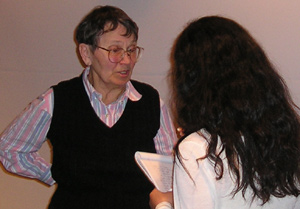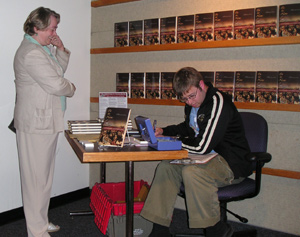|
||
| Return to CORP homepage |
Center hosts author Mary Jane Engh"What Gets Left Out: Religious Persecution in Context"April 18, 2007 - MU's Center for Religion, the Professions & the Public hosted Mary Jane Engh, author of the book, In the Name of Heaven: 3,000 Years of Religious Persecution, on April 18 for a lecture, discussion and book signing. Engh talked about how not paying attention to social and historical context can distort understanding of events, including religious persecution in her lecture, "What Gets Left Out: Religious Persecution in Context." "We don't get the whole picture," Engh said, speaking to about 41 people in Gannett Hall's Tucker Forum. "What you get (when looking at this history) is the patterns that someone saw .... and that made sense to that person." A thorough understanding of history and social context is vital when trying to discern cases of religious persecution, Engh said. She urged those trying to achieve a contextual view of religious persecution to closely look "for role of religion in cases where people don't say there is a role for religion" as well as for factors other than religion in events of persecution defined as religious. "Religion is such an inherent part of human life that it is very artificial to separate it out," Engh said. She urged people to "look at the context - what else is there?" For her studies, Engh defined religious persecution as "repressive actions initiated or condoned by authorities against their own people on religious grounds." Her book covers religious persecutions from Asia, Africa, Europe, the Middle East and North America and presents her belief that awareness makes persecution predictible, and possibly preventable. Engh identified two conditions that can provide "fertile ground" for religious persecution. The first is a close association between government and religion, which "tends to make religious dissent a crime. It doesn't necessarily produce religious persecution," she said, "but it sure makes it easier." The second condition is monotheism, a type of faith that is usually exclusionary by nature, assuming its believers are right and others are wrong. In answer to an audience member's question about whom she would identify as the "most valuable persecutor," Engh named the three main monotheistic traditions of Christianity, Islam and Judaism for this reason. Still, it is possible for secular governments to persecute religion, such as in the 20th-century Communist states, and for polytheistic faiths to persecute, such as in ancient Greece or with modern militant Hinduism.
In general, persecution tends to breed persecution, Engh said, and those that are persecuted are likely - should they rise to power - to persecute others. She emphasized the importance of understanding the context of religion, in history and the present day, leaving it up to "educated people to get along with each other." Engh was introduced by Dan Cohen, a visiting assistant professor with the MU Department of Religious Studies and an affiliated faculty of the Center. An independent scholar, novelist and poet, Engh won a National Endowment for the Arts Creative Writing Fellowship Grant and the 1999 Women's Classical Caucus Oral Paper Award. She is currently working on an extensive reference work on ancient Roman women. She is also the author of three novels, a children's novel, shorter fiction, articles and poems. |
Links in archives are not maintained. |



